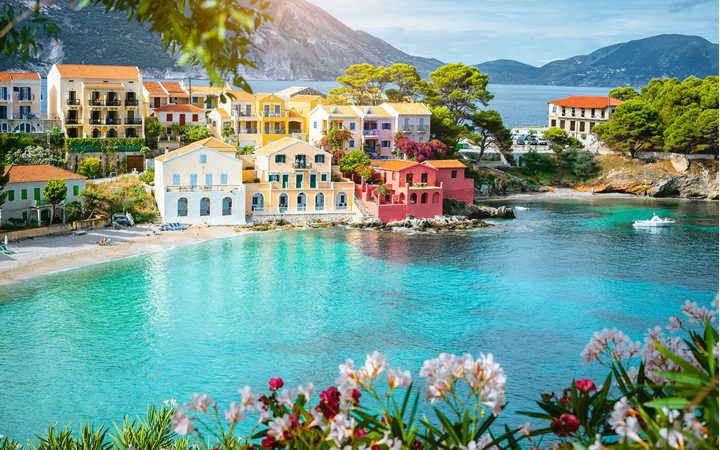Did you know that there are only five places in the world where you can find a Mediterranean climate, and that the land area of those places, added together, equal only about 2% of the globe’s land mass?
The Mediterranean Basin, California, Central Chile, the Cape of South Africa, and portions of Southern and Southwest Australia have this climate. That’s it.
This makes it one of the rarest, if not the rarest, climates in the world. For some reason, the Mediterranean Basin is the most extensive of these areas. It’s probably providential, seeing as the Judeo-Greco-Roman traditions nurtured there gave rise to the West’s greatest civilizations.
The Mediterranean is the best climate in the world, a light, airy climate subject to mild, rainy winters and pleasantly hot and dry summers which tolerate few germs. All in all, this is the most salubrious you can find. The dictionary definition of “salubrious” is “Conducive or favorable to health or well-being.” Tropical climates are nice, but its frequent and abundant rainfall combined with its high temperatures are breeding grounds for germs, and, also ubiquitous, malaria-carrying mosquitoes.
There are all kinds of health benefits to this climate. Its abundant sun helps with the production of serotonin, which puts one in a good mood, and cortisol, known for its ant-stress properties. The sun also helps in the secretion of a substance from our endocrine gland which helps regulate our sleep/wake cycle. The sun also helps in the production of testosterone and progesterone, relaxes our muscles and its ultraviolet properties stimulate calcium and vitamin D production, which strengthens our bones. Sun is also a valuable aid in combating psoriasis, helps lower blood pressure, and promote heart and circulatory system health.
Because the Mediterranean climate is found only in coastal areas, temperatures year round are moderated by the sea. The cooler waters of the sea keep summers from being excessively hot, while the slow release of stored heat in the sea help keep winter temperatures a bit warmer. The climate also, usually, has two consecutive months of summer drought, which helps a lot to keep the mosquito population under control.
The sea is also an aid to health in many ways. Just the sound of waves on the shore is therapeutic: its gentle, natural rhythms soothe and calms you, helping in the production of endorphins, which increase our pain tolerance and our sense of well-being.
Sea level is where the oxygen content of the atmosphere is at its greatest. But more than that, the air by the sea is especially beneficial. It helps our brains to function more efficiently, lowers our stress level, and aids in concentration and attention. The wind off the sea, and the natural chemicals that sea water releases into the atmosphere; sodium chloride, magnesium, iodine, calcium, potassium, bromine and silicon, act as agents which help clear the sinuses of mucus, and help keep the lungs clear. This is why doctors so often prescribe therapies involving relocation to the seaside.
The climate is hospitable to a wide variety of animal life, especially lots of different species of migratory birds.
Trees in this climate tend to be on the short side, with a lot of scrub land, which include a number of aromatic plants such as mints, laurels, myrtles, olives, and carobs. In places where the soil is fertile, the climate is an excellent crop producer, and its long growing season often allows two or more harvests a year.
The foods and domestic animals that thrive in this climate are foundational for the Mediterranean diet: olives and olive oil, abundant fruits and vegetables, grapes and the wine and raisins that comes from them, citrus fruits, lemons in particular, which seem to find their way into every Greek dish, sheep and goats with their meat and yogurt, and all kinds of seafood are the foundational foods of this diet, which has been proven to extend our life spans, and, more importantly, keep us healthy well into old age.
The Mediterranean climate blends seamlessly with what might be called the “Mediterranean lifestyle.” This lifestyle, according to an abstract for Mayo Clinic Proceedings, has been shown to have a 29% lower risk of all-cause mortality, and a 28% reduction in cancer mortality. The hallmarks of this lifestyle are a proper balance between physical activity and rest, including daily afternoon naps, the dietary emphases on vegetables, fruits and nuts, olive oil, and moderate wine consumption, and convivial social habits. This last has been going on for thousands of years, as witnessed by this New Testament verse from the book of Acts:
Now all the Athenians and the foreigners who lived there would spend their time in nothing except telling or hearing something new.” Greeks still love to sit around in the open air, sip coffee, and discuss everything under the sun.
In Greece, the best version of the Mediterranean climate can be found in Attica, which can sometimes be hard to believe because the region is so congested now. Not coincidentally, it was the city state of Athens which produced the first great flowering of Western Civilization.
To the work-obsessed Westerner, the Mediterranean culture can appear to promote laziness, but there seems to be a lot of merit to the idea of working to live, as opposed to its opposite.
If you are unable to live in a Mediterranean climate, the next best thing is to spend your vacations in one. In that respect, we invite you to peruse the articles which can be found on the Grecomap site, which are full of information about Greece, and where you can pass an enjoyable holiday.












